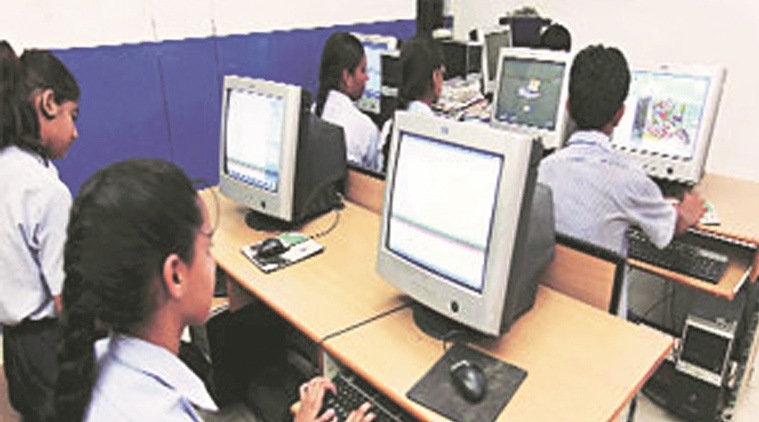Stay updated with the latest - Click here to follow us on Instagram
Chandigarh breaks monotony, sets up 200 smart classes across 9 govt schools
The project, which was taken up by the department in 2015, aims at improving the quality of education at schools by introducing innovative teaching methods for students of classes I to XII.
 In smart classroom at govt school in Chandigarh. Express photo
In smart classroom at govt school in Chandigarh. Express photo
PUTTING AN end to monotonous lectures at city government schools, the UT education department’s project of converting classrooms into smart classes has finally taken off. By introducing LCD projectors, computers and other audio-visual tools, the department has set up 200 smart classes across nine government schools in the city.
The project, which was taken up by the department in 2015, aims at improving the quality of education at schools by introducing innovative teaching methods for students of classes I to XII. Says a teacher from GMSSS-19 where 27 classes have been digitised by the education department, “It is a known fact that the current generation has a shorter attention span, so it is becoming increasingly difficult to retain the interest of students in the classrooms. Through innovative tools and smarter classrooms, students can now be encouraged to take more interest in learning newer concepts.”
The schools where these smart classrooms have been set up in the first phase include GMSSS-18, GMSSS-19, GGMSSS-20, GMSSS-26, GMSSS-35, GMSSS Sarangpur, GMHS Dhanas, GHS-54 and GHS Sarangpur. With the help of active learning modules, interactive quizzes and audio-visuals have been introduced for students through smart classrooms to encourage participative learning. “We now listen to what we earlier used to read, and images have suddenly come to life in the form of videos which help me in understanding the concepts better.
[related-post]
We feel like we are seeing an interesting movie, when what we are actually doing is learning,” said Kulwant, a student of GMSSS-19.
Having tied up with a private company, ExtraMarks, the education department has installed digital boards and computers in classrooms to enhance the classroom teaching methodologies. Interactive themes in different subjects ranging from mathematics, science and general knowledge have also been made available to the students under the smart classroom packages. Principal of GMSSS-35, where 23 smart classes have been set up, Rajat Jain asserts that so far, the project has received a positive response from the students. “The project was initiated by the end of March while the smart classes have been functional since the beginning of this month. For the first two days, instructors from ExtraMarks guided the teachers on how to use the technology, but since then, our teachers have only been handling everything,” he says.
Jain adds that in the last 20 days, officials from the education department had also paid a visit once to ensure the smooth running of the newly installed smart classrooms.
Officials from the education department have stated that feedback will be collected from these 200 smart classrooms in the next two months. “The plan is to convert 1,000 classes into smart classrooms this year. But we will first collect feedback from these classrooms, and then new tenders will accordingly be floated to proceed with the project at other government schools,” says Director School Education Rubinderjit Singh Brar.
Brar says that in the next phase, the Ministry of Human Resource Development’s policy on promotion of information and communication technology (ICT) will also be made part of the smart classroom plan.
Says Praveena Shekhar, a teacher at a city government school, “This new means of imparting education will go a long way in improving the interest of students, and will consequently help them gain more knowledge.”







